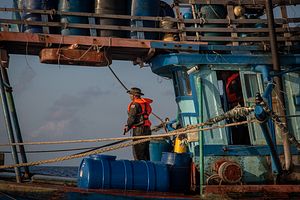After night fell on April 10, 2018 an unremarkable vessel quietly slipped its moorings in the Thai port of Samui and set to sea. The fishing resupply vessel was sailing out into the Gulf of Thailand, the southwestern-most corner of the South China Sea. On board, the crew was in good spirits. They had received coordinates from their dispatch for the best catching, 15 nautical miles from the exclusive economic zone (EEZ) boundary shared between Thailand and Vietnam. During the 28-hour journey to their target, the crew on board the Poseidon went through their equipment, checking their hardware, and watching the horizon.
The Poseidon was a fishing cargo ship, but the crew wasn’t interested in catching fish; the Poseidon was at sea to catch fishermen. As the ship slowly made its way across the gulf, the Thai Royal Police and the Thai Department of Fisheries officers on board were going over their final preparations for their mission.
The Poseidon’s mission is part of a broader effort by Thai authorities to staunch the bleeding of its fish stock. Decades of overfishing and exploitation of the seas have seen a significant decline in the fish population in the two major oceanic bodies abutting the Southeast Asian nation: the Andaman Sea in the Indian Ocean to the west and the Gulf of Thailand in the east.
Environmental Justice Foundation (EJF) staff, working closely with Thai authorities, estimate that in the Gulf of Thailand nearly 90 percent of poachers are small fishing boats from Thailand’s neighbors to the east. Approximately 10 percent are Cambodian boats, while 80 percent originate from southern Vietnam.
The Poseidon is the latest addition to Thailand’s state-of-the-art tactics to protect its fisheries. The unremarkable-looking refitted fish carrier is making remarkable headway in Thailand’s fisheries protection policy through its ability to stealthily intercept poachers. With a focus on enforcing domestic and international fishing laws within Thailand’s EEZ, its success rate at intercepting and arresting poachers in Thailand’s waters has been so significant the government is considering expanding the project. According to data from the Royal Thai Police, from January to July 2018 the Poseidon had arrested 77 fishing vessels, 59 of which were from other countries.































